EWOSA News - July 2022

- Home
- EWOSA News - July 2022
On this page
Welcome to the latest edition of the Energy and Water Ombudsman SA (EWOSA) quarterly newsletter: your one stop shop for emerging consumer trends, hot issues and policy matters.
From the Ombudsman
Perhaps more importantly, we saw fewer complaints than in previous years; there was a slight decrease (from 1,251 to 1,196) in the most recent quarter compared with the same period in the previous year.
Notably, complaints about issues relating to payment difficulties and disconnections continue to be at relatively lower levels, in line with the trend highlighted in our Annual Report. In June, we received 42 credit complaints, compared with 55 in June 2021.
We track these complaints for both energy and water, and report to the Australian Energy Regulator (AER) and the Essential Services Commission of South Australia (ESCOSA) on a regular basis.
We continue our engagement with decision makers about the appropriate regulation for new energy products and services. This newsletter highlights an important AER review on the retailer authorisation and exemption frameworks which commenced during the quarter. These frameworks are the pathway for energy products and services to be captured under the National Energy Customer Framework.
Broadly speaking, we support the framing and direction which the AER appears to be taking in this review. It has captured the breadth of issues to be considered and developed a sound framework to assess risks to consumers and potential mitigants. A review of this nature is by necessity a vast undertaking and the AER’s methodical and considered approach bodes well for the appropriateness of any conclusions about future reform.
We want you to know that we are here to help. Please contact us on 1800 665 565 or via our website if you need assistance.
Sandy Canale
Energy and Water Ombudsman SA
Consumer Trends 1


Hot Topics
In October 2021, National Cabinet endorsed the Post 2025 Distributed Energy Resources (DER) Implementation Plan. This provides a three-year roadmap for reforms required to integrate DER (solar PV, batteries, etc.), and instructs the Energy Security Board (ESB) to move forward.
A key project for the first year is a Retailer Authorisation and Exemption Review, which is being led by the AER with support from the Australian Energy Market Commission and the ESB. The review will consider new models of essential service supply and whether existing consumer protections should be extended.
The AER released its review issues paper for consultation on 22 April. This contained 36 questions on a broad range of topics related to the future of the retailer authorisation and exemption frameworks. Submissions were received until 27 May.
A draft recommendations paper is due to be published in early November, with the final paper scheduled for April 2023. The AER will continue to engage with stakeholders over the course of the review.
Source:
https://www.aer.gov.au/retail-markets/guidelines-reviews/retailer-authorisation-and-exemption-review
The Retailer Authorisation and Exemption Review is being informed by a consumer risk assessment tool developed by the ESB to ensure market bodies consider consumer benefits and risks as part of the design and development of market reforms.
EWOSA attended a one-day AER ESB workshop in Melbourne in late June to explore the potential benefits, risks and harms from emerging energy products and services using the tool.
One step in applying the tool is to apply consumer protection principles to the proposed reform. These principles centre on:
- access to energy
- switching providers
- access to information
- vulnerable consumers
- dispute resolution.
Source:
https://www.aer.gov.au/retail-markets/guidelines-reviews/retailer-authorisation-and-exemption-review
Each year the AER sets a price cap to protect consumers from unjustifiably high prices. It provides a reference point for people searching for the best deal for them.
The latest cap was issued on 26 May, with prices increasing from the previous year, largely due to significant rises in wholesale electricity costs. For a residential customer in South Australia without controlled load, the price was set at $1,840 (4,000 kWh usage). For small business customers it was $4,539 (10,000 kWh usage).
While the price cap is a reference point, some retailers may have market offers which are set higher than the price cap. It is recommended that customers check offers and tariffs; Energy Made Easy is a government site that helps customers find the right plan for their needs.
Source:
https://www.aer.gov.au/news-release/aer-sets-energy-price-cap-to-protect-consumers
Consumer Trends 2
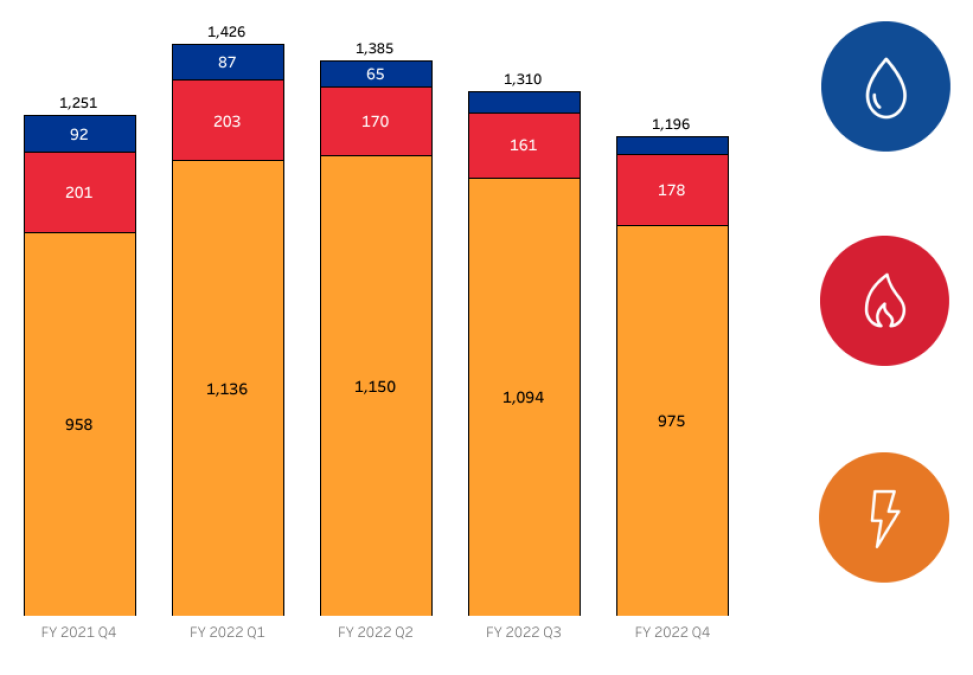

Case Studies
Issues: Land - Property Damage - Delay in Repair
Utility: Water
Customer type: Residential
Case type: Investigation
The issue:
Ms G complained that maintenance work on her property resulted in sunken pavers in the driveway around the sewer inspection point. She was seeking compensation to have the pavers re-laid.
Our review:
We found that as the work was carried out in 2012, it was not fair or reasonable to conclude that it contributed to the current state of the driveway or that there was any negligence.
Resolution:
While we found that there was no liability for compensation, a crew was sent to the property to do some remediation work. Ms G advised that this improved the appearance of the driveway.
Issues: Billing – Back bill – Disputed billing period
Utility: Gas
Customer type: Residential
Case type: Investigation
The issue:
Mr L complained about receiving a high back bill after several estimated reads and sought to have recovery of the undercharges limited to nine months.
Our review:
We found that Mr L had received estimated bills due to access issues with the meter. It is the consumer’s responsibility to provide clear and unhindered access
The evidence supported the retailer’s claim that it had used best endeavours to get an actual read and as such there was no obligation to limit the recovery of the undercharges, as per Rule 30 of the National Energy Retail Rules.
Resolution:
A $150 goodwill credit was applied to Mr L’s account. He also was advised a further $500 credit would be applied if he provided self-reads to the retailer, via the app, on at least three occasions in the following six months.
Consumer Trends 3
Customer Corner
Electricity and gas retailers offer a broad range of assistance and can work with consumers to set up a personal support plan, even if they have not missed a bill.
Retailers provide practical advice on how to reduce energy use, as well as the availability of discounts and government support.
Energy retailers understand that it is a difficult time and are happy to talk to consumers whose circumstances have changed or who are simply worried about their next electricity or gas bill. Retailer contact numbers are at the top of all energy bills.
Source
Winter has a significant impact on energy consumption. Using lights, clothes dryers and heaters more often can result in bill shock, but there are things you can do.
Consider the following:
- ask your retailer to put you on a payment plan
- shop around for a better deal – including from your current retailer
- check out optimum temperature ranges for your heating and cooling appliances
- contact the Energy Advisory Service on 1800 671 907 for advice on the most efficient way to manage energy in the home.
There may be circumstances in which a financial counsellor would be helpful. If so, contact 1800 007 007.
If you have energy or water debt that is more than 60 days overdue, your supplier may report it to a credit reporting body such as Experian, Equifax or Dun & Bradstreet. If this happens, you may find that future applications for credit are rejected.
However, a supplier must complete several steps before a default is reported to a credit reporting body and listed on your credit file
Your supplier also may sell your debt to a debt collector, but again there are rules covering how collectors may pursue a debt. For example, they can only contact you at certain times and cannot use physical force or coercion, harass, mislead or take unfair advantage of any vulnerability, such as a disability.
If you would like to make a complaint against a supplier about debt collection and credit default listing, contact your supplier in the first instance. If you have not resolved your issue after contacting your supplier, lodge a complaint online, or call us between 8.30 am and 5.00 pm, Monday to Friday on free call 1800 665 565.
Please note call charges may apply on mobile phones. If you are calling from a mobile, let us know and we can call you back.
Public Submissions
Consumer Trends 4
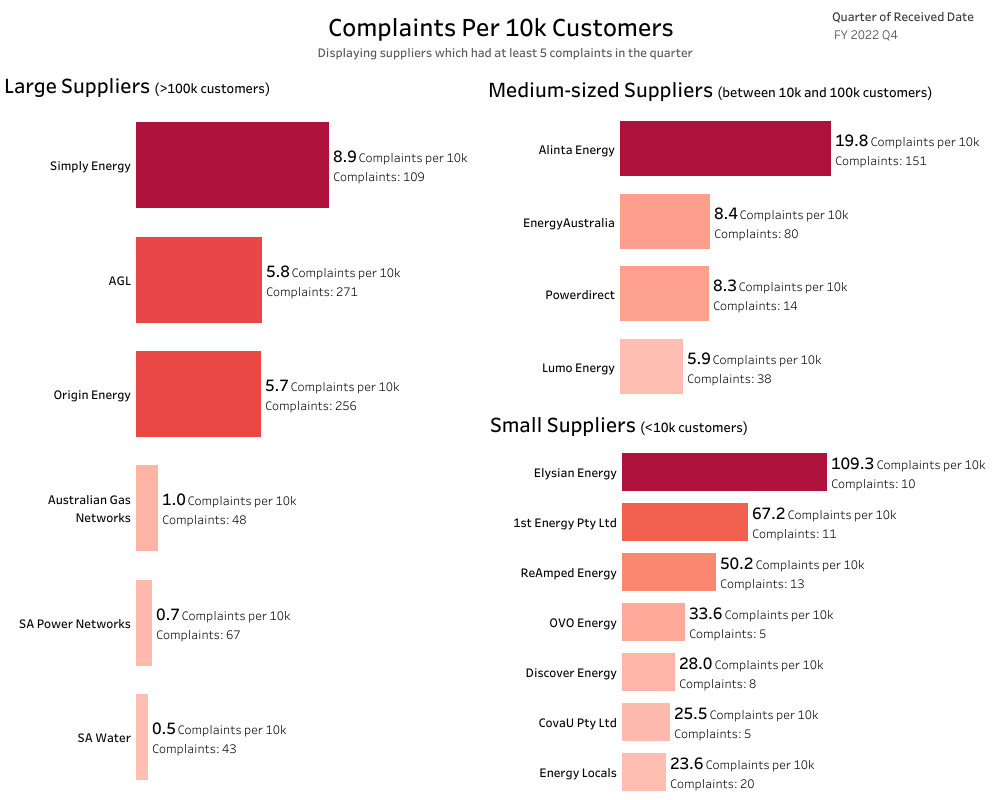
The number of complaints per 10,000 customers for each supplier is calculated by dividing the number of complaints received during the quarter by the total number of customers for each supplier, multiplied by 10,000. Large Suppliers are those with over 100,000 customers, Medium-sized Suppliers have between 10,000 and 100,000 customers, Small Suppliers have between 1,000 and 10,000 customers and Very Small Suppliers have less than 1,000 customers. The total number of complaints is also presented for context.
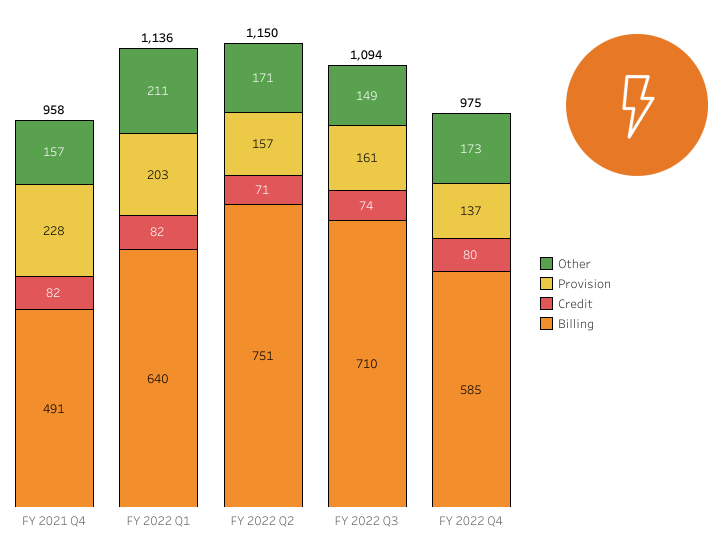
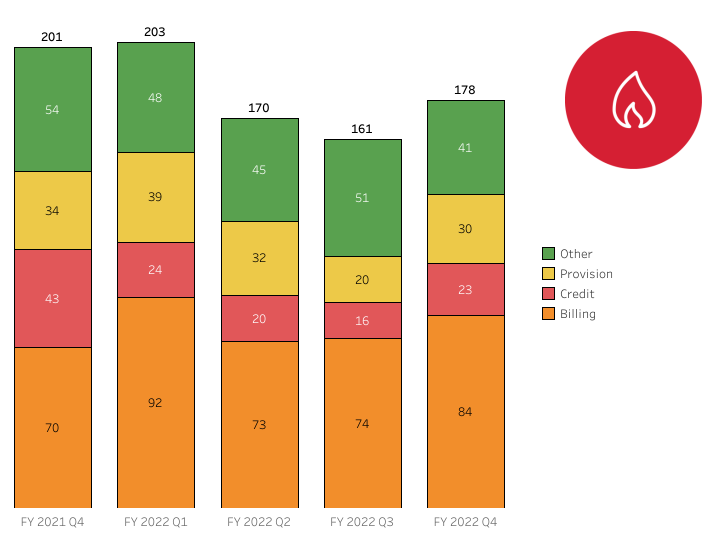
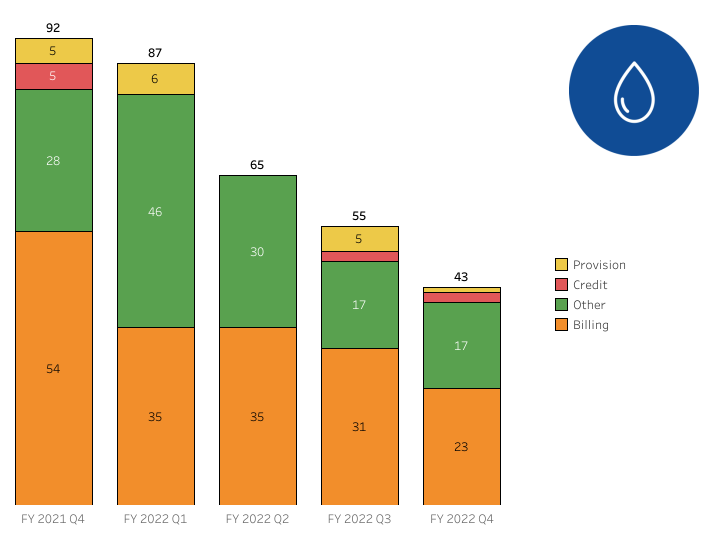
Remember, we are here to help
EWOSA facilitates the prompt resolution of complaints and disputes between consumers of electricity, gas and water services and Members of the Scheme by providing a service to consumers which is free, independent, accessible, fair and informal.
Freecall 1800 665 565
SMS 0488 854 555